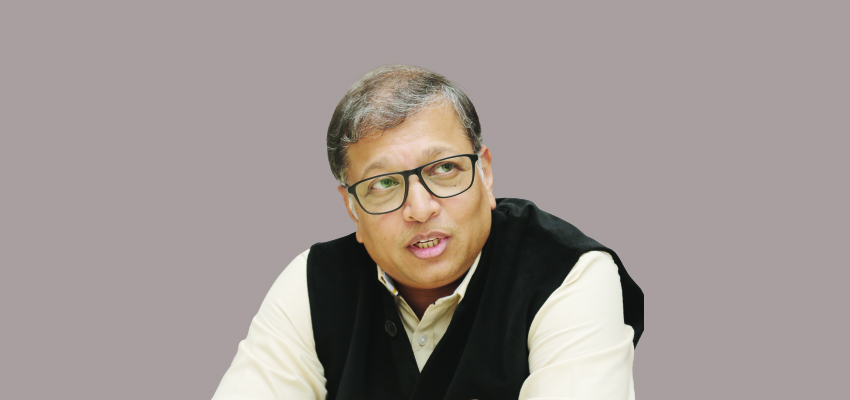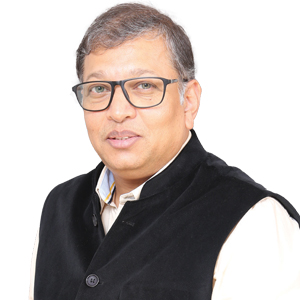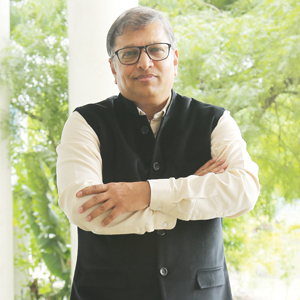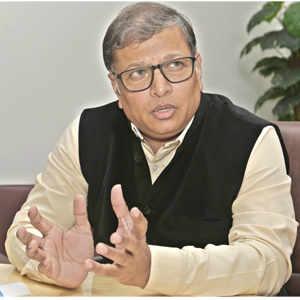HR—CATALYST FOR BUSINESS

"While I recognise the importance of policies and procedures, my approach has always been to assess how HR can actively contribute to achieving business objectives as a collaborative partner"
-Anand Khot
Anand Khot, Director and Talent Practice Leader at Production Modelling India (PMI), is a seasoned Global Human Resources professional with a wealth of expertise spanning over 20 years. Throughout his career, Khot has excelled as a strategic business partner and HR Generalist, assuming increasingly significant roles across India, the UK, and the EMEA Region. His vast experience encompasses collaborating with multinational organisations, where he has successfully engaged with senior leaders and team members dispersed worldwide. Additionally, he has thrived in dynamic environments, working with small to medium- sized businesses driven by rapid growth agendas.
Khot's exceptional people skills and inclusive leadership style have consistently yielded positive outcomes, transcending cultural barriers. In an exclusive interview with Corporate Citizen, he shares insights into his career journey thus far, drawing upon his valuable experiences and learnings. Khot elaborates on his experiences, shedding light on best practices in HCM (Human Capital Management) and discussing its future implications.
Anand Khot's impressive track record and ability to drive impactful change make him an esteemed professional in the field of Human Capital.
Embarking on a dynamic HR role
In the initial stages of my HR career, I embarked on a role as a recruitment consultant. During this time, I had the opportunity to collaborate with prominent organisations in the pharmaceutical, banking, and automobile sectors. My responsibilities encompassed end-to-end hiring processes, ranging from senior-level positions to entry-level roles. This role was unique as it combined elements of sales and HR, given my prior experience in pharmaceutical sales for approximately three years. This valuable background in pharmaceutical sales paved the way for my transition into talent acquisition and recruitment consulting, marking the beginning of my rewarding journey in HR.
How fate led me to new beginnings
My HR journey commenced in 1997 when I joined Omam Consultants, a Mumbai based company situated in Lower Parel. Subsequently, in the mid-1998, an intriguing opportunity arose at Patni Computer Systems due to the Y2K wave that was sweeping the industry. Being a new bee in my HR career and largely ignorant about things like Y2K, my curiosity to explore this path gave me the entry into IT Industry. Concurrently, I had a personal aspiration to transition to the other side of the table and join the industry to further advance my career.
What transpired next was quite remarkable. My initial two years at Patni unfolded by becoming an integral part of the organisation, primarily responsible for campus recruitment. During that year, we successfully recruited around 700 talented professionals from various engineering colleges nationwide. The journey then on was very rewarding with various interesting and challenging roles in India as well as in Europe. The opportunity to work at Patni, was an exciting and fulfilling experience, further fuelling my passion for HR.
"Approximately 70-80 per cent of your role entails executing strategies, and your generalist expertise proves instrumental in working with diverse verticals to realise those strategies. Thus, I believe it is crucial for aspiring strategic HR business partners to gain experience in generalist roles and undergo rotations across various HR sub- verticals"
Encompassing the role of HR Business Partner
Following my successful tenure in campus hiring, my professional journey took a lateral shift toward recruiting experienced professionals. With handling some turnkey senior hiring for large client accounts.
Around the year 2000, the concept of HR business partnering began to gain momentum, and during the period of 2001 to 2003, I had the privilege of being the HR business partner at Patni, entrusted with multiple business units. Simultaneously, we embarked on a significant milestone conducting the world's first assessment on the People Capability Maturity Model (PCMM) under the guidance of KPMG. As a key member of the PCMM Assessment body, our team received training from KPMG, enabling me and the team to contribute to the assessment process; my particular focus was on corporate communication and culture. This marked a momentous phase in my journey, characterised by professional growth and a broadening of my skill set.
To London, as HR Operations Leader

In 2003, a remarkable opportunity presented itself when I was offered the role of HR Operations Leader for Patni, based in London, UK. This opportunity arose during the visit of the then Europe Managing Director, who had come to India to interview potential candidates for the Europe HR position. Europe Managing Director, a sales and business development leader himself, recognised the value of my skill set, particularly my understanding of business development and sales processes. With six years of diverse HR experience under my belt, including business partnering and hiring, I possessed a comprehensive range of HR skills—a profile that appealed to their requirements.
Throughout my career, I have been viewed as a business-centric HR professional, placing significant emphasis on aligning HR practices with the overall business goals. While I recognise the importance of policies and procedures, my approach has always been to assess how HR can actively contribute to achieving business objectives as a collaborative partner.
The year 2003 marked a significant transition for me as I relocated to the UK and assumed leadership of Patni's entire European operations. During my tenure, we successfully established new legal entities in countries such as Finland, the Netherlands, Norway, and more. It was an exhilarating time as the business experienced exponential growth. In 2003, the UK and Europe began to open up further for Indian IT organisations, making it a pivotal market for services. Recognising this trend, we rode the wave of this growing demand. When I first arrived, we had fewer than 100 employees, but within 4-5 years, we witnessed tremendous business expansion, accompanied by an increase in headcount. Additionally, during this period, we successfully completed an acquisition, further strengthening our presence in the region.
The experience of leading Patni's European operations was transformative, allowing me to contribute to the company's growth and establishing a solid foundation for the future.
"Both large multinational firms and boutique startups now have equal opportunities to deliver efficient and scalable services. This shift presents a significant challenge for talent, as the choice of who gets the job is increasingly influenced by the employee rather than the employer"
Unceasing Transformative Learning Experience

My journey of continuous learning continued during my tenure at Patni in Europe from 2003 to 2007. However, by 2007, Dell presented a compelling opportunity that aligned with my experience and coincided with some leadership changes within the organisation. Having dedicated nearly nine years of my career to Patni, I sensed that it was perhaps the right time to explore new horizons, and that's when the Dell opportunity emerged.
At Dell, I initially joined as an HR generalist, responsible for Europe and based in the UK. However, my role at Dell encompassed a new dimension—I also assumed the position of Merger & Acquisition, Integration Leader for HR domain. This addition to my profile was a result of Dell's acquisition of Perot Systems. From 2008 to 2011 was the time when Dell was positioned as a serial acquirer. Multiple boutique firms were being acquired to bolster Dell's services business and expand its capabilities in areas such as Data Centre, Information Security etc. My role entailed integrating these acquired firms into Dell, aligning their practices with Dell's, and facilitating a smooth transition for their employees within the organisation. This crucial integration aspect constituted approximately 50 per cent of my responsibilities, while the remaining portion focused on serving as an HR generalist for the region, supporting Dell's Services business.
The Dell opportunity marked a significant milestone in my career, exposing me to the intricate world of mergers, acquisitions and integration. It provided me with invaluable experience in aligning diverse organisations, benchmarking practices, and ensuring the successful assimilation of acquired talent. Simultaneously, I continued to fulfill my HR generalist role, contributing to the growth and success of Dell's operations in the European region.
Embracing the Olympic spirit
In 2010, the announcement came that London would be the esteemed host city for the 2012 Olympics. As someone who had been involved in sports since childhood and had represented my school in Handball and Basketball, I believed that my international exposure and experience working with US multinational companies would be valuable assets in this role.
Under the chairmanship of the legendary runner, Sir Steve Coe in IOC for the 2012 Olympics, I had an opportunity to Volunteer for the London Olympics 2012, as well as for the Paralympics. It was a profound demonstration of my passion for sports, international collaboration, and the spirit of unity that the Games embody. It was an honor to contribute my skills and support the athletes, delegates, and dignitaries from around the world who gathered in London to celebrate the pinnacle of athletic achievement.
Empowering HR professionals
In 2016, I got an opportunity to volunteer for NHRDN, one of the largest communities of HR professionals. I was offered the role of Vice President, for the Pune Chapter—from 2016 to 2019. Moreover, I had the privilege of assuming the role of President for the Pune Chapter of NHRDN start ing in August 2019. As President, I joined the esteemed group of presidents from large chapters who were inducted into the national board of NHRDN. Serving in this capacity has been a fulfilling experience, allowing me to contribute to the development and advancement of the HR community at a national level.
During my tenure as vice president and president, Pune Chapter won the best chapter award twice, after a gap of 24 years, and in competition with large chapters like Mumbai, Delhi, Bangalore, and Chennai, for that matter.
Return to India the onward journey

Initially assigned to the UK for 18 months, my career extended to over nine years due to organisational growth and challenging assignments. During this time, I gained international exposure and valuable experience in HR. At that point, I recognised the need to bring back my acquired knowledge and international exposure to the evolving landscape of HR in India.
Transitioning back to India, I assumed the role of HR leader at IBM Global Business Services from 2012 to 2022, driving change management initiatives and overseeing large-scale HR responsibilities. Seeking further self-discovery, I became the CHRO at Pharmarack, a tech start-up focused on pharmaceutical supply chain improvement and providing analytical insights to the Pharma Industry in India.
The onward journey unfolded opportunity to develop the Human Capital Practice at Production Modeling India as its Director and Human Capital Practice Leader.
Reflecting on my journey, I am grateful for the experiences and growth that shaped me into who I am today.
Understanding the cultural background and work meanings of professionals from different regions is vital for successful interactions and effective execution of HR processes and programmes. Building rapport and being seen as part of the community you engage with is a top priority
CC: Throughout your career, you witnessed the evolution of HR practices, particularly during a time when Industrial Relations (IR) held greater prominence. As an early adopter of the HR business partner role, you embraced the shift towards specialisation and business- focused HR functions. Could you please elaborate on your experience navigating these role changes and share your thoughts on the ongoing relevance of a generalist HR role?
In the role of an HR business partner, there is a need to encompass a generalist perspective as your primary focus is on addressing multidimensional people-centric issues within the organisation. Whether it involves talent retention or hiring, you act as a conduit between various verticals within the company.
You collaborate on co-creating business strategies to support organisational growth. To bring these strategies to life, you must engage with multiple HR sub-verticals, relying on your generalist understanding. Without this knowledge, it becomes challenging to collaborate effectively with teams responsible for implementing the strategies co-developed with business leaders.
While the title of "strategic business partner" suggests a focus on strategic decision-making, the reality is that the execution of strategies demands the majority of your time and effort. Approximately 70-80 per cent of your role entails executing strategies, and your generalist expertise proves instrumental in working with diverse verticals to realise those strategies. Thus, I believe it is crucial for aspiring strategic HR business partners to gain experience in generalist roles and undergo rotations across various HR sub-verticals.
In today's HR landscape, which encompasses around 13-14 sub-verticals, having an understanding of how these functions operate and their interdependencies with both HR and other organisational functions is paramount. By acquiring this knowledge and immersing oneself in different roles, you can become a true partner to both the business and fellow HR professionals, effectively executing strategies tailored to the organisation's needs.
CC: In the current landscape, we see a rise in the prominence of HR specialist roles, which may be attributed to the emergence of HR technology. Considering this trend, do you anticipate that the HR function will eventually evolve into primarily specialised roles as HR technology continues to advance?
The prominence of HR specialist roles today is not solely driven by technology, but technology does play a crucial role in shaping the HR landscape. Historically, HR technology adoption has been relatively delayed compared to other key business processes. Enterprise applications focussing on core organisational processes took priority, followed by areas like manufacturing, supply chain, procurement, and finance. HR technology implementation came later in the hierarchy.
Furthermore, existing HR technology offerings, particularly within ERP systems, have been more functionally oriented rather than extensively incorporating data science, machine learning, or analytics. As a result, we are witnessing the emergence of boutique HR tech solutions and products in the industry. These tools address the need for deeper insights and analytical outcomes required for day-to-day decision-making in HR. Many organisations, including large enterprises, are implementing these specialised tools alongside their existing ERP systems to achieve a synergistic outcome for people practices and HR functions, leveraging the data stored within the ERP. This collaboration between boutique firms and ERPs is creating a more holistic and effective HR technology ecosystem.
"The ability to embrace continuous learning and evolve is critical. The shelf life of skills is shortening, and professionals must proactively identify and pursue their next skill journey to avoid career stagnation"
CC: Based on your extensive experience working both abroad with multinational corporations and in India, could you please share the key differences you have observed in HR practices between these two contexts?
I think the two most important factors for HR professionals working abroad are: 1) cultural sensitivity, and 2) legal acumen, enabling them to navigate diverse environments effectively while avoiding potential pitfalls and fostering a positive employer brand.

The primary distinction I've observed between HR practices abroad and in India is the significance of cultural differences. As an HR professional, it is crucial to be sensitive to cultural nuances as it influences people's perceptions of work in various countries. Understanding the cultural background and work meanings of professionals from different regions is vital for successful interactions and effective execution of HR processes and programmes. Building rapport and being seen as part of the community you engage with is a top priority. Many multinational corporations now provide cultural sensitisation content to facilitate quick integration into new environments.
The second key aspect is having a thorough understanding of the legal framework in different countries. Employment laws vary across jurisdictions, and compliance with the local laws is essential. Even when an employee is on assignment from an Indian company to another country, the employment contract and regulations of the host country prevail. Likewise, adhering to the specific legal requirements in each location, regardless of the organisation's origin, is critical. HR professionals must possess a solid grasp of the legal landscape to mitigate potential risks, protect the organisation's reputation, and ensure compliance with employment-related activities.
CC: In the post-pandemic era, when hiring new recruits for your HR department, what are the emerging skills and competencies you consider essential for HR professionals in today's evolving landscape?
In the post-pandemic era, there are three key skills that have become crucial for HR professionals. Firstly, adaptability and agility are vital behavioural skills, enabling professionals to navigate the rapidly changing landscape. Secondly, proficiency in utilising technology has become essential as technology is integrated into various industries. Lastly, regarding core job skills, the ability to embrace continuous learning and evolve is critical. The shelf life of skills is shortening, and professionals must proactively identify and pursue their next skill journey to avoid career stagnation. Growth and comfort cannot coexist, and remaining in one's comfort zone can be detrimental to career progression. Furthermore, the competition in the technological domain has equalised due to the democratisation of technology through cloud computing. Both large multinational firms and boutique startups now have equal opportunities to deliver efficient and scalable services. This shift presents a significant challenge for talent, as the choice of who gets the job is increasingly influenced by the employee rather than the employer. The industry is expected to undergo drastic changes in the next 6-7 years, driven by talent perspectives and the emergence of the gig economy and moonlighting trends.